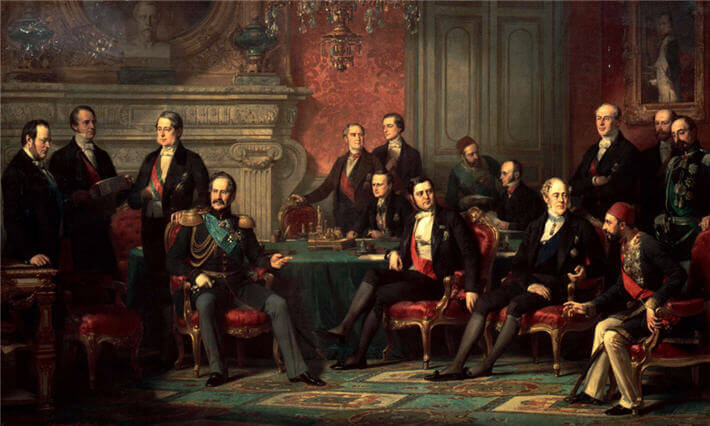Crimean War
 The Crimean war (1853-1856) was a war between the most powerful nations of Europe. The British Empire, the French Empire, the Ottoman Empire and the small Kingdom of Sardinia fought against the Russian Empire. This was the first opportunity for the English and the French to fight side by side, an opportunity that would be renewed 60 years later during the First World War. Although much of the fighting took place in the Ottoman Balkans, along the Turkish-Russian border of Causase, in the Black Sea and in the Baltic Sea, much of it took place around the naval base in Sevastopol, in the peninsula of Crimea (hence the name given to this war).
The Crimean war (1853-1856) was a war between the most powerful nations of Europe. The British Empire, the French Empire, the Ottoman Empire and the small Kingdom of Sardinia fought against the Russian Empire. This was the first opportunity for the English and the French to fight side by side, an opportunity that would be renewed 60 years later during the First World War. Although much of the fighting took place in the Ottoman Balkans, along the Turkish-Russian border of Causase, in the Black Sea and in the Baltic Sea, much of it took place around the naval base in Sevastopol, in the peninsula of Crimea (hence the name given to this war).
After its apogee at the end of the 17th century, the Ottoman Empire entered a period of decadence and was called as the 'sick man of Europe'. This weakness encouraged the European powers to intervene in its internal affairs under the pretext of protecting the Christian minorities. Russia was particularly active in this field because the Orthodox represented about 30% of the Ottoman population.
The official cause of the Crimean war was the control of the holy places. Before the beginning of the war in 1853, there was a severe tension between the French Catholics and the Russian Orthodox for the protection of the 'Holy Lands' (the Church of the Holy Sepulcher of Jerusalem and the Basilica of the Nativity of Bethlehem , etc., occupied jointly by various Christian religious congregations). But the real cause of the war was the expansionist policy of Russia and the desire to end the Ottoman occupation of the Balkans, to control the straits (from the Black Sea and the Dardanelles) and thus to reach the Mediterranean sea . The Russian troops invaded the principalities of Wallachia and Moldavia, which were under the Ottoman rule on 1 July 1853, forcing the Ottomans to declare war on 23 October.
France and the United Kingdom feared the collapse of the Ottoman Empire, which would affect the balance of great Powers in Europe due to increasing Russian control in the area.
On 27 March 1854, France and United Kingdom declared war on Russia. An act of alliance between the two nations was signed on 10 April.
On 21 January 1855, an agreement was signed between France, the United Kingdom and the Kingdom of Sardinia, which entered the war against Russia.
After many sieges (Silistra, Petropavlosk, Sebastopol, Taganrog, Kars) and battles (Isatcha, Oltenita, Cetate, Giurgevo, Kurekdere, Bomarsund, Alma, Balaklava, Inkerman, Eupatoria, Chernaya, Malakoff, Kinburn) the war ended with the victory of the Allies. A peace congress was held in Paris from February 25, and a treaty of peace was signed on 30 March 1856 (Treaty of Paris). The President of the Congress was Walewski, Minister for Foreign Affairs of Napoleon III. Russia, the Ottoman Empire, France, Great Britain, the Kingdom of Sardinia, Austria and (later) Prussia were represented there.
With this treaty Russia agreed to:
1. Abandon its sovereignty over the Danubian principalities.
2. Not prevent free navigation on the Danube.
3. Accept the neutralization of the Black Sea and no longer have on its shores a naval arsenal.
4. To renounce any protectorate over the Christians of the Ottoman Empire.
Victims of the Crimean War:
France: 95 000 deaths (some 60 000 deaths of sickness)
United Kingdom: 22 000 deaths (some 16 000 deaths from sickness)
Kingdom of Sardinia: 2,200 dead (2166 deaths of sickness)
The Ottoman Empire: Number of victims / dead estimated between 100,000 and 175,000
Russia: Approximately 450,000 dead
The diseases that caused the deaths of thousands of soldiers were cholera, typhus, dysentery, typhoid fever and scurvy.
The Crimean War can be considered one of the first modern wars for several reasons:
1) First use of railways to transport troops.
2) The use of the telegraph to improve communication between the high dignitaries of the state (United Kingdom and France) and commanders on the battlefield. In addition, press information was sent to the newspapers with the telegraph in a few hours instead of a few weeks.
3) Improvement in the care of wounded and sick soldiers with the work of Florence Nightingale and Mary Seacole, two nurses who pioneered modern nursing practices in the British Army.
4) The Crimean War marked the beginning of photojournalism in the world. Although the American-Mexican War (1846-1847) or the Second Anglo-Silesian War (1848-1849) was already photographically documented, the goal was not photojournalism. The people of Britain were informed about this war thanks to articles and photographs by journalists William Russell (for Times newspaper) and Roger Fenton.
5) The British and the French used the new striped rifles, thus increasing the accuracy and gravity of their fire.
6) Use of the first large steamship warships (Napoleon of the French fleet, HMS Agamemnon of the English fleet)
Today, when one travels the capital of the United Kingdom (London), of the France (Paris) and Istanbul (former capital of the Ottoman Empire), one can see that this war has left many imprints and memories in these cities . I wanted to document everything that commemorate the Crimean War in these three great cities of Europe in a single website.